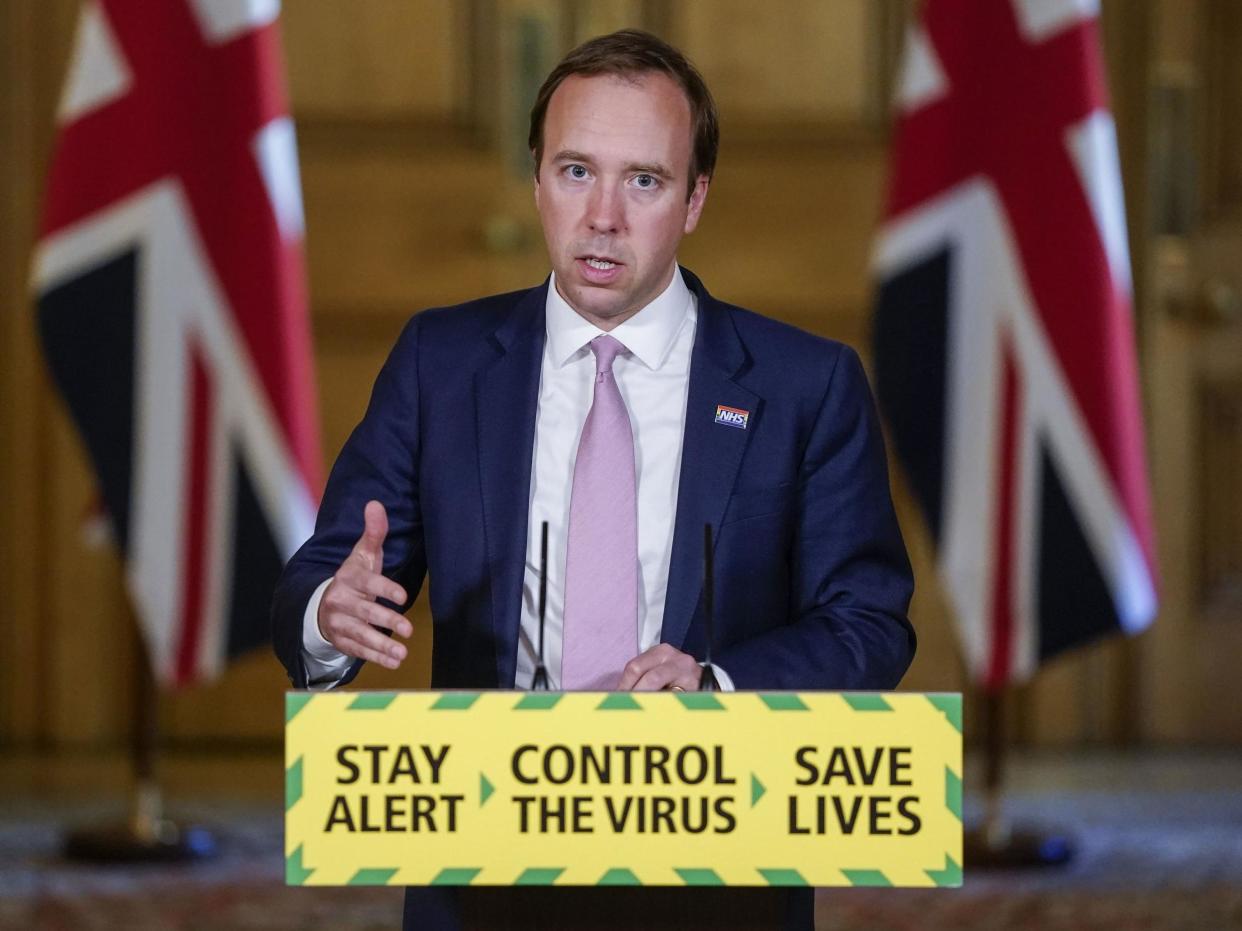Matt Hancock says UK is ‘winning the battle against coronavirus’, but warns disease not beaten yet

Matt Hancock has said the UK is winning the fight against coronavirus as he told anyone with symptoms they must get a test.
There were just 1,570 new confirmed cases of Covid-19 in the UK yesterday, the health secretary announced.
But he warned the public not to get carried away following today’s limited easing of lockdown restrictions, adding: “The disease is not beaten yet.”
Mr Hancock led the daily Downing Street briefing as some children began to return to school in England.
But early indications suggest that the number of pupils actually back in the classroom varies significantly depending on local area.
Last night senior public health experts made a last-minute call for ministers to delay the lifting of some lockdown rules, warning it was too soon and the country would struggle to deal with any resultant surge in cases.
Mr Hancock said: “The data show that we are winning the battle against coronavirus.
“Today we are therefore able to make some cautious changes to the lockdown rules, carefully and safely.”
But he warned that “the disease is not done yet”.
“We must all remember that in the war against this virus we are all on the same side. We have come so far together, we can take these steps together.
“But do not step too far, the disease is not done yet.
“We mustn’t throw away the progress that has been made.”
The easing of restrictions also coincided with the government’s new track and trace programme.
The scheme is designed to ensure new causes are identified quickly and those in danger of carrying the infection informed.
Mr Hancock began the briefing with an appeal for anyone with symptoms to get a test.
Despite reports that some of the 25,000 people recruited as contact tracers have been given little to do, the health secretary insisted the new system had been “successful” since going into operation in England last Thursday.
He said that “the vast majority” of the 9,000 people who have tested positive since the new system began have been contacted by tracers.
“Many of them are able to put their details in on a web-based portal rather than directly on the phone,” he told the Downing Street press conference.
And he said: “The system is up and running, it’s successful. I’m very glad to report that those who are asked to isolate by the contact tracers are expressing the willingness to do so and we track that very carefully.”
Mr Hancock said that the numbers of contacts reported by each coronavirus patient was lower than had been modelled when the system was being prepared, probably because of the reduction in social activity under lockdown.
Testing tsar John Newton said he was “very pleased with the level of completeness” of contacts being reported, though neither he nor Mr Hancock were able to provide any figures.
In the case of a renewed spike of coronavirus infections, Mr Hancock did not rule out the reimposition of lockdown restrictions nationwide, but made clear the government’s preferred solution would be localised measures, such as the shutdown of new admissions to A&E at individual hospitals.
“We are attempting to move the system from these national, blanket measures to a more targeted approach – this is why test and trace is such an important part of that,” he said.
“But we have always said that we are prepared to reintroduce measures – whether that is nationally or in response to a localised outbreak – if that is necessary.”
Mr Hancock rejected suggestions that the 30 May decision to relax “shielding” protections for the most vulnerable people had been “rushed”, saying: “We announced it when it was safe and ready to do so, and as I think you can see from the charts that we put up, one of the reasons that we could make that change is that the rate of incidence of disease is now back down to the levels that it was before we introduced the shielding policy.”
He also revealed that the Joint Biosecurity Centre which is tasked with establishing the Covid alert level has not yet been set up.
The recovery strategy published by Boris Johnson on 11 May announced the creation of the independent JBC, bringing together world-leading epidemiological expertise to assess the state of the pandemic and advise the chief medical officers on the UK’s position on a five-level alert system, ranging from a Level 5 outbreak where the disease risks overwhelming the NHS to Level 1 where the virus has been eradicated from the country.
Downing Street today said that the partial relaxation of lockdown restrictions was made possible by the fact that, while the alert remains at Level 4 it is “moving towards” Level 3.
But asked about the JBC’s work, the health secretary revealed that the new body was still “being formulated at the moment”.
“We are getting it stood up, making sure that all the information flows come to it so it is able to analyse them and to make sure that it gets set up correctly,” he said.
Read more
Striking photos show cities returning to normal after lockdown
Tories join revolt to stop older and sick MPs losing 'right to vote'
UK coronavirus death toll rises by 111 to 39,045
No coronavirus deaths across 11 London hospitals in 48 hours


